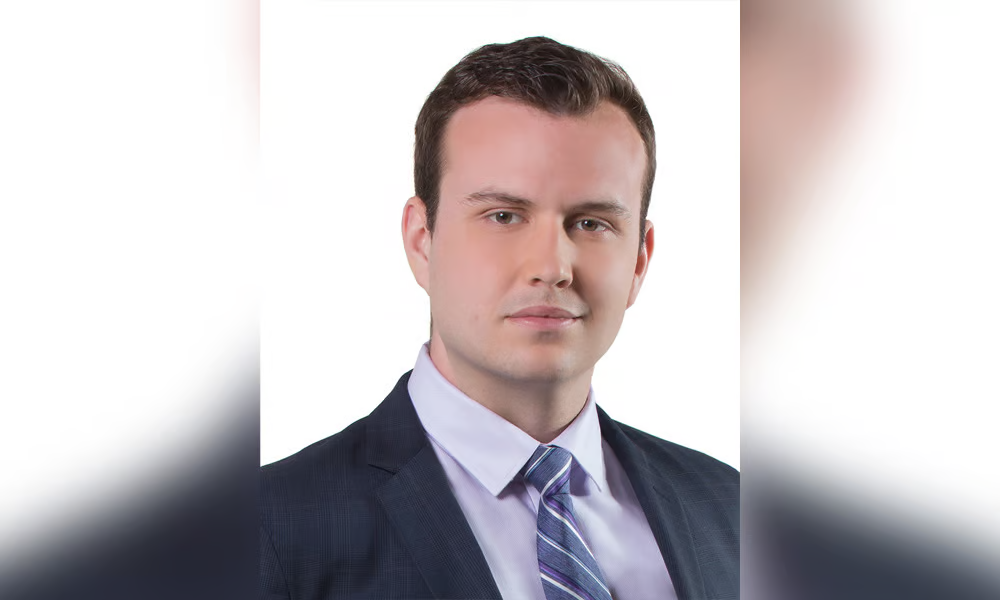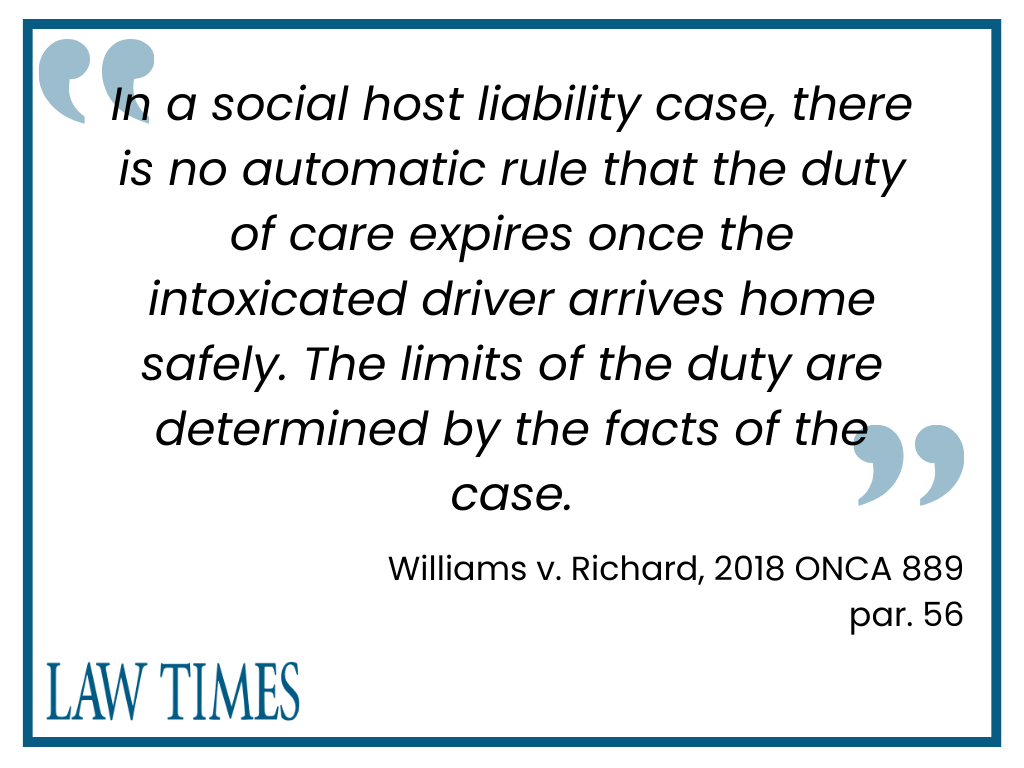
If you're hosting an event where alcohol is served, you must be aware of social host liability. Learn more about this rule and important court decisions

Updated: October 9, 2024
If you’re holding a party and serving drinks, you may want to hold on to that liquor and ask yourself, "Am I legally responsible for my intoxicated guests?" To answer this question, it’s important to look at the legal precedent called social host liability.
We’ll be discussing the general rules and certain exceptions when it comes to this precedent, in addition to some court updates from McLeish Orlando LLP. This article can be used by lawyers as an educational piece for their clients involved in cases for social host liability.
Social host liability is a common law principle that holds social hosts liable for personal injuries involving their drunk guests after leaving their premises. In other words, if their guests become injured or have injured other people, the social host will become liable to the injured person/s. A classic example of this is when a drunk guest causes a car accident. This rule stems from the responsibility of the social host to control the acts of their guests after serving them alcoholic drinks.
In Canada, case law has ruled against social host liability; at a certain point, social hosts must not be liable for the injuries caused by their intoxicated guests. However, on a case-by-case basis, the courts have also ruled that there are instances when social host liability attaches, holding party hosts liable for injuries to third parties.
Here’s a brief general explainer on what social host liability is about:
Cases on social host liability are under the specialization of personal injury lawyers. Check out this Special Report from Canadian Lawyer, one of our sister publications, on the Best Personal Injury Law Firms for a directory of the best lawyers in this practice area.
The following may be considered as “social hosts,” who can be held liable for the injuries caused by or to their guests:
The basis for holding these people accountable, even to third persons, is their supervisory roles over the drunk person, or their control over the situation. However, as we’ll later learn through the court decisions below, the rule is not definite. Each case is weighed by the courts differently than the other.
Canadian courts’ decisions apply social host liability on a case-by-case basis. As such, there are two sets of rulings on the matter:
Despite a Supreme Court ruling that sets a high bar for a successful social host liability suit, these cases are still worth pursuing, says William Harding, an associate at McLeish Orlando LLP in Toronto.
 William Harding is an associate at McLeish Orlando LLP.
William Harding is an associate at McLeish Orlando LLP.
The ruling that the personal injury lawyer is referring to is the case of Childs v. Desormeaux, [2006] 1 S.C.R. 643, 2006 SCC 18. This case is one of the earliest Supreme Court decisions, which ruled that private social hosts of parties are not liable for the injuries caused to third parties by the hosts’ drunk guests. In doing so, the Court ruled that these social hosts do not owe a duty of care to these injured third parties.
Harding explains that within the Supreme Court’s high test, opportunities exist to successfully pursue justice in these cases. He adds that these cases on social host liability are extremely dependent on their facts. Through a thorough examination of the facts and some novel arguments, lawyers at McLeish Orlando were able to win a breakthrough case at the Ontario Court of Appeal around social host liability, despite, or in some ways because of, the Supreme Court’s test.
“In Childs, the Supreme Court denied the claim against a social host. However, they outlined just how facts-driven this analysis is,” he says. “Despite denying that claim, since then, there have been cases with slightly different factual circumstances that will allow the claim to proceed. Our firm has always been pushing this type of claim.”
One such example of McLeish Orlando’s work in this area was a Court of Appeal ruling in late 2018 in the case of Williams v. Richard, 2018 ONCA 889. One of the main principles established by this case is that “[i]n a social host liability case, there is no automatic rule that the duty of care expires once the intoxicated driver arrives home safely. The limits of the duty are determined by the facts of the case.”
In this case, Williams became intoxicated while drinking several beers with Richard in Richard's home. Williams left and went home where he picked up his children and their babysitter to drive the babysitter home. He later got in a collision, which killed him and injured his children.
A summary judgement motion brought by Richard stated that no duty was owed to the injured children. The judgement ruled that a duty of care couldn’t be established and even if it could, Williams had gone home before driving his children and their babysitter. The duty of care ended when he got home.

McLeish Orlando principal partner Patrick Brown, along with Harding, elected to appeal that judgement. At the Court of Appeal, they went about highlighting the key factual differences between Williams and Childs.
“In Childs, it was a larger party, and the extent of the drinks provided was a small champagne toast. Everyone brought their own drinks…there's less control over the situation,” Harding says. “In Williams, there were only two people, the social host provided 100% of the alcohol consumed, and the guest ultimately drove away very intoxicated. This host had every opportunity to observe his guest. He was the one who actually provided him all of the alcohol. So that's a huge distinction from Childs. The host here was actually instrumental in creating the risk.”
The lawyers also argued that the duty of care didn’t end when Williams arrived home. The Court of Appeal agreed, saying that the unique facts of the Williams case put it over the high bar set by Childs.
Harding thinks there are wide-ranging ramifications for this Court of Appeal decision. In the more common cases of commercial host liability, the acceptance of his argument that liability doesn’t end at home could expand the liability of bars and restaurants serving liquor. Harding stressed, though, that this liability would be determined on a case-by-case basis.
This is not the first time McLeish Orlando has successfully made this argument. In 2016, Dale Orlando and Joseph Cescon successfully defended a summary judgment motion seeking to dismiss the claim of a seriously brain injured plaintiff. In that case, the plaintiff, Linton, became intoxicated at the defendant's restaurant and then returned home to a rented ski chalet. Sometime after arriving home, he proceeded to fall down a set of stairs and suffered a serious injury. The defendant argued that the duty of care owed to Linton ended when he arrived home. Orlando and Cescon were successful in arguing that the duty owed does not automatically end after arrival home, and Linton was able to continue to pursue his claim.
Harding says the ruling in Williams stems from McLeish Orlando’s ethos as a personal injury firm driven to tackle challenging legal issues and make favourable law for plaintiffs.
“It takes a tremendous amount of time and resources to pursue these types of cases properly, but as a firm, we relish the opportunity to create favourable precedents for injured plaintiffs and their loved ones. We think we are uniquely positioned as a firm to commit these kinds of resources to advancing these claims. That's why we are willing to pursue novel arguments in terms of expanding the duty of care owed to social and commercial guests as well as fight to distinguish cases from Supreme Court decisions when necessary. It's just something that we think we're in a position to do and are always willing to pursue.”
On another perspective, here’s a video which explains more about social host liability and some of its exceptions:
For more lawyers in Ontario who can help with cases involving social host liability, head over to another of Canadian Lawyer’s Special Report on the Top Law Firms in Ontario.
While parents may argue that it’s better that minors drink in their presence, any injuries that underage drunk guests inflict may be attributed to their negligence. In Wardak v. Froom, 2017 ONSC 1166, the Frooms organized a party for their son. While the Frooms did not serve drinks during the party, they were aware that their son and his friends were drinking. Later, one of their son’s underage friends, Wardak, got drunk, left the party, and had a serious car accident. Wardak became quadriplegic with cognitive impairments because of the accident.
Wardak sued the Frooms, arguing that they breached their duty of care over him. On the other hand, the Frooms relied on the Childs case and summarily moved to dismiss the case. In dismissing the Frooms’ motion for summary judgment, the court ruled that that a positive duty of care may exist between the Frooms and Wardak. However, the court held that it cannot make any more legal determinations, justifying that a trial be held for this case.
This case is, again, proof of how courts determine if social hosts are indeed liable for the injuries caused, either to the drunk guest themselves or to third persons. As with the Williams case, the Wardak case on social host liability also shows that the precedent set the Childs is no way absolute and set in stone.
To avoid being declared at fault under social host liability, organizers of events where alcohol are served can do any of these things:
Following any of these steps will come in handy, not just in ensuring that everyone is safe, but also when facing the court after something unexpected happens. The main point is that hosts must be prepared and proactive in ensuring that everyone gets home safely.
Even after the beer bottles have been swept away and the guests bid their farewells, laws still apply, such as the principle on social host liability. While common law gives some leeway on party hosts since each case is measured by their own circumstances, it’s still important that both hosts and guests be cautious. As such, the overkill reminder of drinking responsibly still rings true, whether it be in social functions or personal joyful events.
More articles about the legal concepts on personal injury, such as the social host liability, can be found on our page for the Personal Injury practice area.